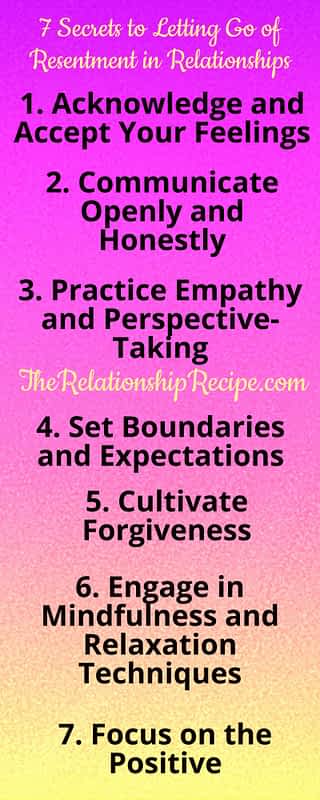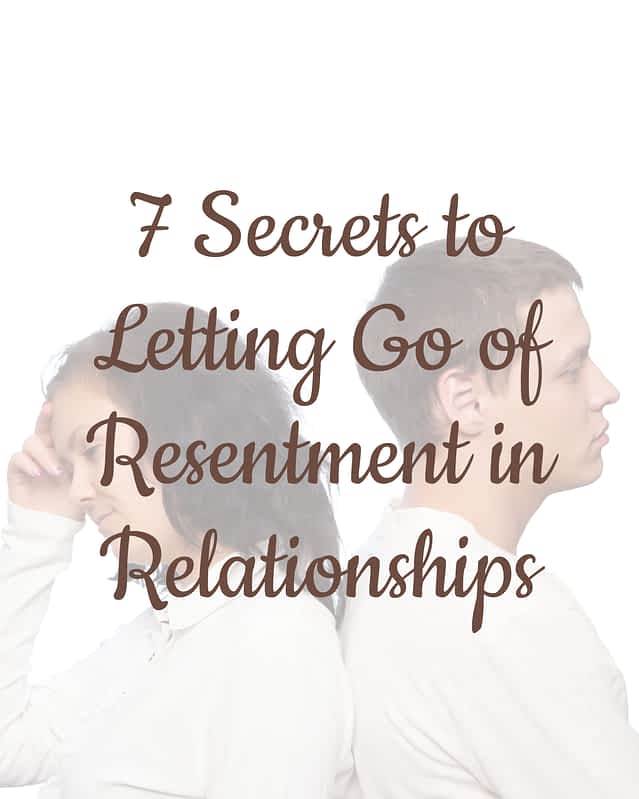7 Secrets to Letting Go of Resentment in Relationships
Resentment doesn’t just show up – it simmers. Quietly. Slowly. Until one day, you look at your partner and realize the warmth is gone, and all that’s left is frustration you can’t quite name. That’s the sneaky part about letting go of resentment; most of us don’t even notice how deep it’s burrowed in until the connection feels cold and brittle.
In one of my other posts, I called resentment an “insidious, quiet little monster,” and I still stand by that. It starts off as a justified reaction to being hurt, dismissed, or treated unfairly. But if we let it sit too long and we keep swallowing it down instead of dealing with it, it starts poisoning everything. Communication breaks down. Touch becomes rare. And emotional closeness becomes non-existent.
If you’re struggling with how to forgive in a relationship or feel like you’re carrying emotional weight you didn’t ask for, you’re not alone, and this is your sign to face it. It’s hard, but letting go of resentment is possible. And it changes everything.

💡Key Highlights:
- Why resentment quietly sneaks into your relationship and what it’s really doing to you
- The surprising ways resentment shows up not just emotionally, but physically
- Simple but powerful steps to start letting go of resentment, even when it feels impossible
- How practicing forgiveness can transform your relationship without losing yourself
- Why focusing on what’s still good can be your secret weapon for healing and moving forward
The first thing you have to do, is identify the root causes of resentment in your marriage. Once you have put your finger on the causes, the real work starts for healing.
However, if your spouse continues to do the things that make it difficult to let resentment go, it is beyond challenging when there isn’t enough time to “scab over” or heal before the next insult or hurt, then you may need to consider individual counseling should you want to stay in and work on the marriage.
🖤If your spouse is unwilling to work with you in letting go of resentment, or stop doing the things that cause it, then you will need to learn how to manage it yourself, and then assess whether you want to stay or go from the relationship.

Can You Resent Someone and Still Love Them?
You can absolutely feel resentment toward someone and still love them. Those two things can, and often do, exist at the same time. Most of us aren’t quick to give up on people. We hang in there because we see their good side, we remember the sweet moments, and we hope things can get better. That’s why it’s so common to feel torn. Resentment usually comes from deep hurts or unmet expectations, not a lack of love. So if your heart feels conflicted, you’re not broken. You’re just human.💘

Where Resentment Lives in the Body, and Why Letting Go of Resentment Sets You Free
Resentment doesn’t just live in your mind, it camps out in your body too. You might feel it as a heavy weight in your chest, that tight, knotted feeling in your shoulders or neck, or even a churn in your gut that won’t go away. That’s the physical side of emotional stress.
Not letting go of resentment in relationships doesn’t just mess with your connection, it puts your nervous system in a constant state of tension. And over time, that pressure builds. Your body starts carrying what your heart hasn’t unpacked yet.
This is why it’s so important to do what you have to do to let it go. Your resentment is not only poisoning you, but your entire life and possibly everyone around you in severe cases.🖤

The 7 Secrets to Letting Go of Resentment
The good news is that there is a cure for resentment – if one is willing to let it go. By implementing these seven secrets, you can learn to let go of resentment and restore love and harmony to your relationships.
1. Acknowledge and Accept Your Feelings: The first step to letting go of resentment is to acknowledge and accept your feelings. It’s okay to be hurt or angry. By owning your emotions, you can begin to process them and find a path forward.
2. Communicate Openly and Honestly: Resentment often arises from unspoken expectations or misunderstandings. Have a candid conversation with your partner about your feelings. Use “I” statements to express your emotions without blaming or attacking them.

3. Practice Empathy and Perspective-Taking: Try to understand your partner’s perspective and consider the factors that may have contributed to their behavior. Empathy can help bridge the gap between you and cultivate a sense of compassion.
4. Set Boundaries and Expectations: Resentment can stem from feeling powerless or disrespected. Establish clear boundaries and expectations to protect your emotional well-being. Communicate these boundaries assertively – but respectfully.💪

5. Cultivate Forgiveness: Forgiveness is a powerful tool that can release you from the grip of resentment. It doesn’t mean forgetting or excusing the hurt, but rather choosing to let go of the negative emotions and move forward. Practice self-compassion and consider seeking support from a therapist or support group.
6. Engage in Mindfulness and Relaxation Techniques: Resentment can manifest physically in the body, causing tension and stress. Incorporate mindfulness practices like meditation, deep breathing, or yoga to release physical and emotional tension.
7. Focus on the Positive: Shift your attention towards the positive aspects of your relationship. Cultivate gratitude and appreciation for the good things your partner brings to your life. 🚀

Final Thoughts on How to Forgive in a Relationship
Letting go of resentment isn’t easy. It takes guts to face what’s really going on beneath the surface. But healing is possible, and so is finding your way back to love, even if things feel messy right now.
It starts with being honest about how you feel: no more pretending you’re fine when you’re not. From there, it’s about learning to open up (even when it’s awkward), practicing empathy (even when you don’t want to), setting boundaries that protect your peace, and slowly, intentionally choosing forgiveness, not for them, but for you.
Add a little mindfulness, sprinkle in a focus on what’s still good, and you’ve got the ingredients for something better. Not perfect, but real. And that’s a relationship worth fighting for.

Thank you for reading this post, don't forget to subscribe!







